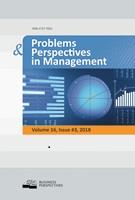Improving the management technique of logistics planning in the supply chain
Improving the management technique of logistics planning in the supply chain
Author(s): Liljana A. Sosunova, Sergey Noskov, Irina A. Goryacheva, Natalia V. Astafieva, Sergey A. KalashnikovSubject(s): Economy, Business Economy / Management
Published by: ТОВ “Консалтингово-видавнича компанія “Ділові перспективи”
Keywords: logistics processes; management model; management technique; principle design; supply chain;
Summary/Abstract: The multidimensionality of transformations that take place, the diversity of destabilizing factors in the environment reduce reliability, sustainability, efficiency of both logistics processes and the entire production and economic activity, and they need their modern economic reflection. The successful activity in the unstable economic environment is impossible without proper strategic analysis and the formation of the effective management system that requires the search for new techniques, the development of logistics-oriented concepts, management approaches to logistics processes that can ensure the goals achievement under the continuous systemic development and disturbance flow. The goal of the research is to improve the technique and develop a management model for logistics processes, considering the effect of the disturbance flow. In accordance with the goal, it is necessary to solve the following scientific problems: to reveal the patterns of logistics processes for the formation of a signal system on management points within the framework of management structures; to develop components of the management technique for logistics processes, taking into account the disturbance flow; to systematize and supplement the principles of logistics processes for the formation of the rational totality of components in the management technique. Thus, the implementation of the proposed management technique for logistics processes will lead to the formation of optimal management impacts within each element, subsystem and the entire structure of the supply chain, ensuring the sustainable development vector at each time period and achieving the goals set under the influence of the disturbance flow, adaptability, flexibility and efficiency of processes.
Journal: Problems and Perspectives in Management
- Issue Year: 16/2018
- Issue No: 3
- Page Range: 48-62
- Page Count: 15
- Language: English

